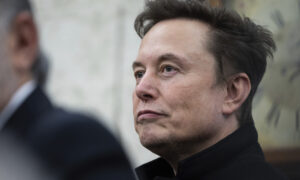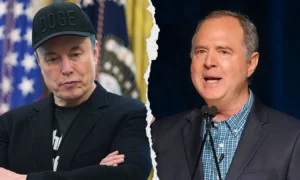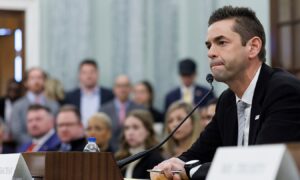Campaigning with her running mate, Minnesota Gov. Tim Walz, Democratic presidential contender Kamala Harris stands during a rally at the Liacouras Center in Philadelphia on Aug. 6, 2024. | For AWN, Jamie Kelter Davis
Inflation in the United States has finally begun to decline, according to prominent economists and Federal Reserve officials. The burden of convincing American voters that Vice President Kamala Harris can steer the economy through its consequences now falls on her shoulders.
Jobs are becoming scarcer. Many financial institutions are revising their predictions for a recession in the United States. Credit card and auto loan payments are being skipped by more and more Americans. Expectations of delinquency, which measure the probability of a minimum payment being missed on outstanding debt, have reached their highest point since the height of the COVID-19 pandemic.
These cracks are appearing at the same time that more and more economic indicators point to the end of the Federal Reserve’s lengthy battle against inflation.
According to the Labor Department’s announcement on Wednesday, inflation hit a new low last month, the lowest level since the beginning of 2021. There was a slowdown in price increase in the economy’s “core” areas, and overall, prices rose by 2.9% year over year, pushing the Federal Reserve closer to its 2% target.
According to recent statistics, the state of the economy as a whole is now the biggest concern, rather than price surges specifically. While lowering prices is still the Fed’s top objective, officials are paying more attention to the effects of two years of high interest rates on businesses, the labor market, and consumers, especially those with low or moderate incomes.
Harvard University professor and former chief economist to President Obama Jason Furman said on X following the release of the Consumer Price Index report, “This gives [the Fed] permission to do whatever they need to for the employment side of the mandate.”. The market is bracing for the Federal Reserve to slash interest rates by half a percentage point, which is twice the average amount, if the August jobs report is weak, much like the July figure was.
Harris and other Democratic candidates will need to revise their economic policy pitches in light of these changing realities. The White House and its supporters spent months trying to convince the public that their policies were responsible for the economy’s resilience in the face of rising prices and high borrowing costs. Currently, that base is exhibiting indications of stress, coinciding with inflation reaching a stage where the Federal Reserve can contemplate reducing interest rates.
Veteran Democratic strategist Jim Manley, who advised former Senate Majority Leader Harry Reid (D-Nev.) on economic policy, expressed his relief that he is not in charge of economic messaging. “You can’t pretend like everything is fine and walk around pretending.”
“Try jamming it, and they’ll probably balk,” he said.
Harris is likely to confront corporate price gouging and try to refine her economic policy message in Raleigh, North Carolina, on Friday. Her administration is expected to lower expenses for middle-class Americans.
Her unexpected surge in the polls versus Trump, the former president, on the issue of the economy may be further solidified by the speech. People have been more lenient with Harris than they have been with President Joe Biden when it comes to his economic policies.
At a rally in Asheville, North Carolina, later this afternoon, Trump is expected to criticize Harris over the “economic hardships” brought forth by policies implemented by the Biden administration, as reported by his campaign.
He’ll be appealing to voters’ deep-seated dissatisfaction. Contrary to popular belief, the United States is not (or, more precisely, is highly unlikely to be) in a recession at the moment. When it comes to necessities like housing, high prices continue to be a big problem for many families. Voters’ views of the economy are unaffected by price increases, regardless of how consumers react to disinflation.
The number of registered voters who ranked inflation as the most important issue they would consider when casting their ballots dropped from 14% to 6% in the first half of this year, as price increases moderated, according to surveys conducted by NYT/Siena. Rather than focusing solely on issues related to cost of living, a larger portion of respondents expressed concern about the overall health of the economy, which includes labor and stock markets.
Nonetheless, according to Tobin Marcus, head of U.S. Policy and Politics at Wolfe Research and a former adviser of Harris’s, reduced inflation might lead to “simpler and cleaner” economic messaging from Harris.
The majority of workers will not be affected by salary cuts or layoffs, and “it’s already too late for [an economic] softening around the margins to be a political problem,” he stated. [A lower rate will have a more noticeable impact] instead.
Credit card interest rates, mortgage rates, and other types of finance might be affected swiftly by a rate cut by the Federal Reserve in September. Businesses may now be able to expand after being held back by higher lending rates for two years.
In a statement released on Wednesday, Biden said that “core inflation has fallen to the lowest level since April 2021” and that “inflation has fallen below 3%.” “We are making real progress, but there is still a long way to go before we can reduce costs for working Americans.”









